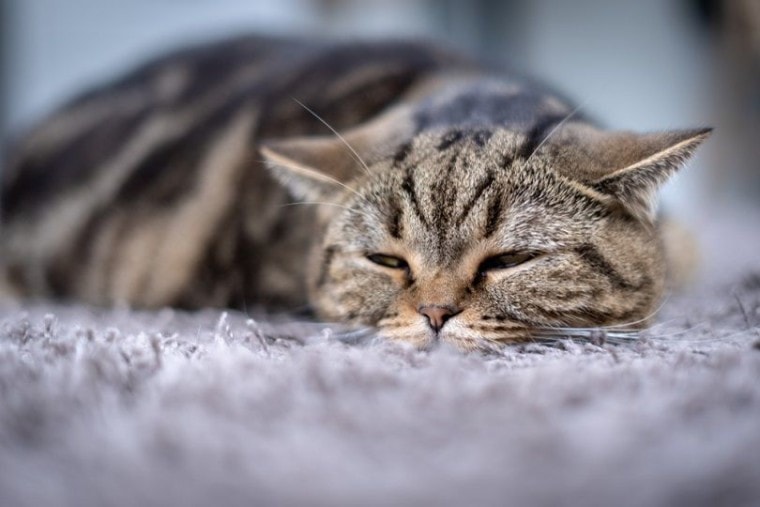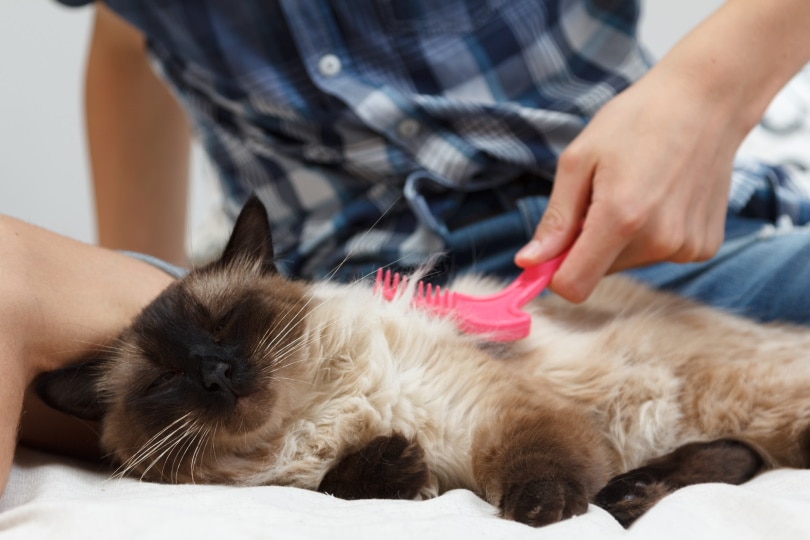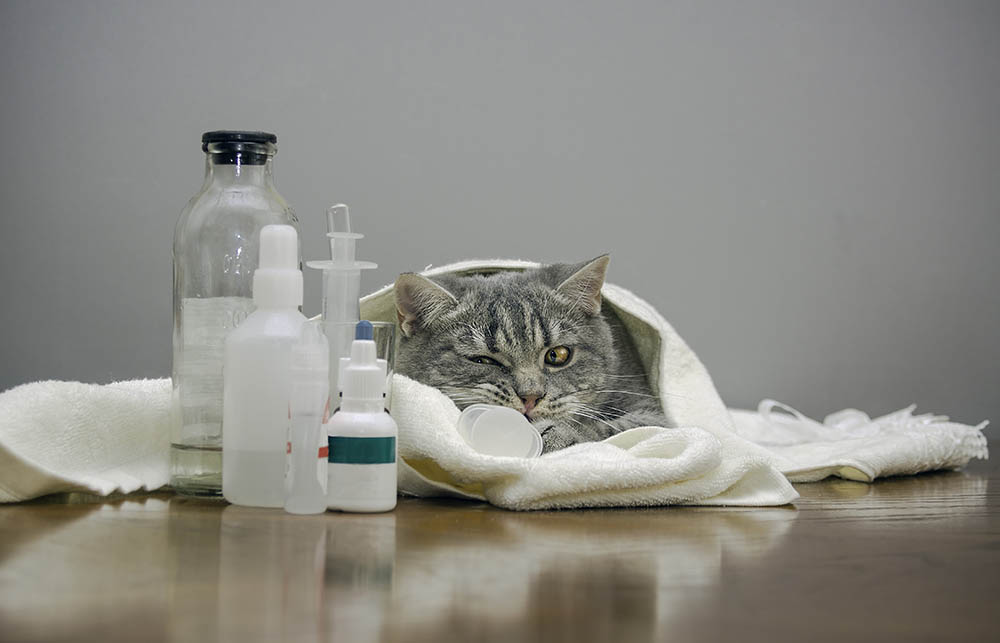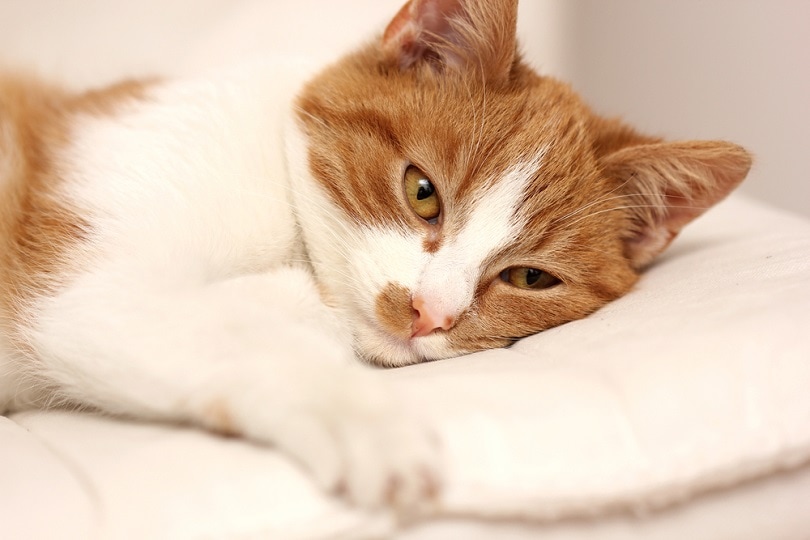
Upper respiratory infections, or “colds”, are common in cats. If you’ve ever had a cold, you’ll know that it can leave you feeling miserable and uncomfortable. The same is true for your favorite felines.
Cat colds vary in severity—some cats show mild symptoms that clear up within a few days, while other cats show severe symptoms and may take several weeks to recover. On occasion, upper respiratory infections can be life-threatening, usually as a result of secondary infections, poor nutrition, and dehydration. Kittens, older cats, and immunosuppressed cats are more likely to become severely ill from colds.
Cat Cold Symptoms

Typical signs of a cold include:
There are several home remedies that can aid in your cat’s recovery if it has a cold, however, it’s important to seek veterinary care in order to confirm the diagnosis and for your cat to be given appropriate medication before you implement any of these remedies. As mentioned previously, what you may think is a harmless cold can turn into a life-threatening situation for your cat, so it’s best to err on the side of caution and get your cat examined by a vet.
Altering Your Home for Sick Cats
If there is more than one cat in your household, the first thing to do is to isolate your sick cat by confining it to a separate room. This helps to minimize the spread of the infection between cats. Upper respiratory infections are highly contagious and easily transmitted between cats. Another way to protect the other cats in your household is to make sure that their vaccinations are up to date. Vaccines for respiratory illnesses usually come standard as part of your cat’s annual vaccinations. Unfortunately, these vaccines do not protect against respiratory infections entirely, but they can reduce the severity of illness.
If possible, disinfect the surfaces that your sick cat has come in contact with using a veterinary disinfectant. Take care when using disinfectants around cats as some disinfectants are toxic—speak to your veterinarian about the right one to use.
The 7 Home Remedies For Cat Colds:
1. Clean the Eyes and Nose
Help your cat to feel better by gently wiping away discharge from the eyes and nose using a cotton wool ball soaked in warm water.
2. Groom Your Cat

Sick cats often stop grooming themselves so it’s important that you groom your cat at least once a day using a brush or comb.
3. Nebulization With Steam
Nebulization delivers a fine mist of water to the upper airways and lungs, which helps to reduce congestion by loosening secretions. To nebulize your cat, place it in a cat carrier in the bathroom, close the door and windows, and turn off any vent fans. Run a hot shower and allow the bathroom to fill with steam. Keep your cat in the steam-filled bathroom for 10 to 15 minutes. Sick cats should ideally be nebulized once daily.
4. Run a Humidifier
It is also helpful to run a humidifier in the room in which your cat spends most of its time. Humidifiers release water vapor into the air, which helps keep the sinuses moist and eases the symptoms of a cold.
5. Provide Nutritional Support
Cats with colds often have a decrease in appetite or stop eating and drinking entirely. A poor sense of smell caused by a blocked nose, mouth ulcers, and a general feeling of sickness and discomfort, are responsible for a sick cat’s loss of appetite. It is extremely important that your cat continues to eat and drink while sick. A sick cat that does not get adequate nutrition will struggle to heal and is at risk of becoming even sicker. Cats that stop drinking will dehydrate – dehydration can be life-threatening.
Offer your sick cat strong-smelling food such as kitten food or fish. Cats with mouth ulcers may prefer soft food. Warming the food may make it more palatable. You may even need to syringe feed food if your cat refuses to eat.
Keep a close eye on the water levels in your cat’s bowl and ensure that your cat is drinking enough water. You can check your cat’s hydration levels using the “skin tent” test. Gently grab a section of your cat’s skin between its shoulder blades and lift it up. When you release the skin, it should snap back into place quickly. However, in a dehydrated cat, the skin will remain in a tented position and return into place slowly or not at all. If your cat is dehydrated, it is best to seek veterinary care right away.
The use of the amino acid supplement Lysine has questionable value in treating cats with upper respiratory infections caused by the Feline Herpes Virus. Lysine is believed to work by interfering with viral replication, thereby reducing the severity of symptoms associated with a cold. Trials with lysine have, however, given mixed results. Short-term use isn’t harmful and may be worth a try.
6. Create a Stress-Free Environment
Latent Feline Herpes Virus infections, commonly responsible for feline colds, are often “reactivated” during times of stress. A stressed cat also takes longer to heal from illness; stress can affect a cat’s immune system and ability to fight disease.
Provide a quiet space where your cat can recover undisturbed, as well as comfortable beds, hiding places, and scratching posts. Make sure that your cat has access to fresh water at all times and provide frequent meals. Your cat’s litter box should be kept clean at all times and be positioned in a spot with easy access. Pheromone diffusers and sprays, such as Feliway, have a soothing, calming effect on cats, and can be used to help reduce your cat’s stress levels while ill.
7. Provide Warmth

If the weather is cold, keep the indoor temperature where your cat spends most of its time at a comfortable temperature. You may also need to provide an additional heat source such as a heating pad or hot water bottle for your cat to lie on or snuggle up to. Keep the heating pad on a low setting and wrap the hot water bottle in a towel or blanket to prevent burns.
What Not to Do When Managing a Cat’s Cold

Although the symptoms of colds are similar in people and in cats, their treatment is very different. Never give your cat cold remedies specifically formulated for humans. Paracetamol, a drug commonly found in human cold and flu medicine, is extremely toxic to cats. Cats cannot process paracetamol and ingestion of even a tiny amount of this drug can seriously damage the liver and red blood cells and result in death.
Ibuprofen is another drug typically used in the treatment of colds and flu in people. Although relatively safe in humans, cats are unable to efficiently metabolize this drug and can develop ibuprofen poisoning at low doses.
What Causes a Cat to Develop a Cold?
Most feline upper respiratory tract infections are caused by Feline Herpes Virus and Feline Calicivirus. According to icatcare.org, these two viruses are thought to be responsible for more than 90% of feline upper respiratory tract infections.
Bordetella bronchiseptica and Chlamydophila felis, both bacterial organisms, may also be involved in some cases.
Prognosis
Most cats will recover from a mild cold within 7 to 10 days. However, severe infections can be life-threatening and recovery can take several weeks. Some cats may also be left with permanent damage to the nasal passages after recovering from an upper respiratory infection and have a recurrent nasal discharge.
Many cats that recover from colds caused by viruses will become carriers. Carrier cats usually show no signs of illness but can shed the virus and infect other cats. In some cats that carry Feline Herpes Virus, stress (due to changes in the home, disease, illness, etc.) may cause the virus to become reactivated and cause disease.
Related Reads:
- 8 Reasons Why Your Cat Sneezes on You (Based on Science)
- Why Won’t My Cat Stop Sneezing? 6 Causes, Diagnosis & Treatment
Featured Image Credit: one photo, Shutterstock








